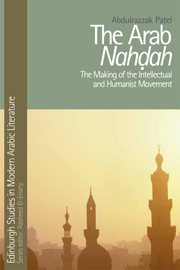Book contents
- Frontmatter
- Contents
- Series Editor's Foreword
- Acknowledgements
- Preface
- Introduction: Perspectives, Paradigms and Parameters
- 1 Contemporary Interpretations of the Nahḍah: Tradition, Modernity and the Arab Intellectual
- 2 The Reintegration of Pre-modern Christians into the Mainstream of Arabic Literature and the Creation of an Inter-religious Cultural Space
- 3 Guardians of the Pre-modern Arab-Islamic Humanist Tradition: Legends without a Legacy, a Tradition without Heirs
- 4 Language Reform and Controversy: The al-Shartūnīs Respond in Defence of the Pre-modern Humanist Tradition
- 5 Arabism, Patriotism and Ottomanism as Means to Reform
- 6 Arab Intellectuals and the West: Borrowing for the Sake of Progress
- 7 Education, Reform and Enlightened Azharīs
- 8 Enacting Reform: Local Agents, Statesmen, Missionaries and the Evolution of a Cultural Infrastructure
- Conclusion
- Bibliography
- Index
4 - Language Reform and Controversy: The al-Shartūnīs Respond in Defence of the Pre-modern Humanist Tradition
Published online by Cambridge University Press: 05 October 2013
- Frontmatter
- Contents
- Series Editor's Foreword
- Acknowledgements
- Preface
- Introduction: Perspectives, Paradigms and Parameters
- 1 Contemporary Interpretations of the Nahḍah: Tradition, Modernity and the Arab Intellectual
- 2 The Reintegration of Pre-modern Christians into the Mainstream of Arabic Literature and the Creation of an Inter-religious Cultural Space
- 3 Guardians of the Pre-modern Arab-Islamic Humanist Tradition: Legends without a Legacy, a Tradition without Heirs
- 4 Language Reform and Controversy: The al-Shartūnīs Respond in Defence of the Pre-modern Humanist Tradition
- 5 Arabism, Patriotism and Ottomanism as Means to Reform
- 6 Arab Intellectuals and the West: Borrowing for the Sake of Progress
- 7 Education, Reform and Enlightened Azharīs
- 8 Enacting Reform: Local Agents, Statesmen, Missionaries and the Evolution of a Cultural Infrastructure
- Conclusion
- Bibliography
- Index
Summary
One of the most significant features of the nahḍah was the importance that was placed on the Arabic language. Nearly all intellectuals took an active interest in the language, and the majority of debates that characterised the nahḍah centred on issues related to it as scholars engaged one another on practically every aspect, from its qualities and shortcomings, its function and importance in society, to its various problems and need for reforms. These debates involved all the major intellectuals of the nahḍah, albeit that different linguistic, religious, ideological and even political impulses motivated these scholars, which often meant that they expressed divergent attitudes towards the language. As far as the question of language reform is concerned, however, one can isolate the proponents of two main discourses: the conservative reformists and the liberal reformists. The later part of the nineteenth and early twentieth centuries witnessed a considerable amount of linguistic controversy mainly, though not exclusively, between these two groups of scholars. Research to date has offered a number of explanations for the controversy, but has failed to realise the great extent to which pre-modern developments, especially among Christians, were a major factor in the linguistic debates that formed such an integral part of the nahḍah. Based on an extensive study of original sources, this chapter examines the main linguistic debates of the period and attempts to shed light on some of the underlying factors fuelling the controversy in the light of pre-modern developments.
- Type
- Chapter
- Information
- The Arab NahdahThe Making of the Intellectual and Humanist Movement, pp. 102 - 126Publisher: Edinburgh University PressPrint publication year: 2013



